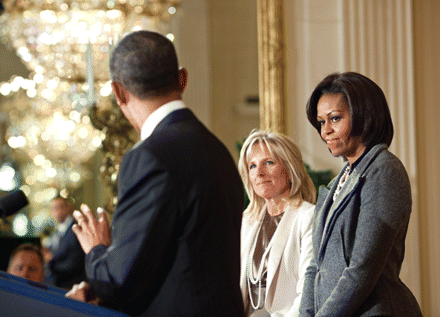Supporting military families is becoming the new watchword in Washington, and leading that effort are the nation's first and second ladies, Michelle Obama and Jill Biden.
On April 12, the two women—introduced by their husbands (who have significant jobs in their own right)—discussed further steps that they hope will enhance resilience among the families of military service members through a project called Joining Forces.
Their work is part of a White House program announced in January to enhance the well-being of military families, improve education for their children, increase child-care availability, and develop educational and career opportunities for military spouses.
"[W]e're going to focus on the specific things our military families have told us they care most about and things that I think that all of us can make a unique contribution to—the areas of employment, education, and wellness, and that includes mental health," said Michelle Obama. "We're going to remind this nation that, just as our troops deserve the best support when dealing with the stresses of war and long deployments, so do military spouses and children."
APA and other professional organizations are also bringing their expertise to bear on the effort. Two segments of the "Healthy Minds" TV series, hosted by psychiatrist Jeffrey Borenstein, M.D., and shown on PBS stations nationwide, will deal with veterans' mental health. The American Psychiatric Foundation (APF) and APA provide support for the program and advice on its contents, said Linda Bueno, director of industry relations for the APF.
APA has also developed an algorithm for psychiatrists to help them follow up on the patient screening question, "Have you been in military service?"
In her remarks, Obama noted that some large corporations have agreed to reserve job vacancies for employees who are the spouses of military personnel and are transferred to new locations where the businesses also operate.
"Companies like Sears, Kmart, and Sam's Club are telling military spouses who work at their stores that if they move to a new duty station, they'll do their best to have a job waiting for those spouses," said Obama. Walmart and Target have also signed up. The large electronics firm Siemens is setting aside 10 percent of its open positions for veterans, she added.
Such initiatives are critical for the families of enlisted personnel, because military salaries are low and often must be supplemented by a spouse's outside income. Frequent moves make it hard for the spouse to hold a job or find one in a new location, so stabilizing a spouse's employment can go a long way toward strengthening families already facing high levels of stress.
Rotary and Lions clubs, which are strong in rural areas and small cities, also have been enlisted in the Joining Forces initiative. They are starting outreach efforts to find and help families living near military bases in their regions.
Veterinarians have stepped up to donate some types of care for military families' pets.
In addition, APA members organized several sessions at this month's annual meeting in Honolulu at which leading military and VA psychiatrists discussed combat trauma and readjustment problems, including one session focusing on the effects of the extended period of war on soldiers and their families. (Coverage of the annual meeting will begin in the next issue.)

